
Revista Eletronica Ventilando Acervos
Scope & Guideline
Exploring the Frontiers of Archival Science
Introduction
Aims and Scopes
- Museology and Cultural Heritage Management:
The journal explores various aspects of museology, including the management, conservation, and curation of collections, with a focus on cultural heritage preservation. - Digital Technologies in Museums:
A significant emphasis is placed on the integration of digital technologies within museum practices, including virtual tours, digital collections, and the use of technology for conservation and education. - Participatory and Community Engagement:
The journal highlights participatory approaches in museology, emphasizing collaboration with communities in the preservation and interpretation of cultural narratives. - Interdisciplinary Research:
It encourages interdisciplinary research that combines museology with fields such as information technology, education, and cultural studies, fostering innovative solutions and discussions. - Documentation and Conservation Techniques:
The focus is also on the methodologies and techniques used in the documentation and conservation of artifacts, providing insights into best practices in the field.
Trending and Emerging
- Virtual and Augmented Reality Applications:
There is a growing trend in exploring virtual and augmented reality applications in museums, providing immersive experiences that enhance visitor engagement and learning. - Blockchain and Digital Asset Management:
The integration of blockchain technology for collections management and provenance tracking is gaining attention, highlighting innovative approaches to safeguarding cultural heritage. - Community-Centric Approaches:
An increasing focus on community-centric approaches in museology is evident, emphasizing the importance of local narratives and participatory practices in the management of collections. - Sustainable Museology Practices:
Emerging discussions around sustainability in museology are becoming more prominent, addressing the environmental impact of museum practices and promoting eco-friendly initiatives. - Interdisciplinary Collaboration:
There is a trend towards interdisciplinary collaboration, where museology intersects with fields like education, sociology, and technology, fostering innovative research and practices.
Declining or Waning
- Traditional Historical Narratives:
There has been a noticeable decrease in publications focused solely on traditional historical narratives, as the journal shifts toward more contemporary and participatory approaches to museology. - Physical Exhibition Models:
Papers discussing conventional physical exhibition models are less frequent, indicating a growing preference for digital and virtual exhibition formats in response to technological advancements. - Local and National Collection Policies:
Research centered on local and national collection policies appears to be declining, as broader and more global perspectives in cultural heritage management gain traction. - Static Museological Practices:
There is a waning interest in static museological practices that do not incorporate interactive or digital elements, reflecting a shift towards more dynamic and engaging museum experiences. - Narrow Academic Discourses:
The journal seems to be moving away from narrow academic discourses that do not connect with broader societal issues, favoring studies that address contemporary challenges in museology.
Similar Journals
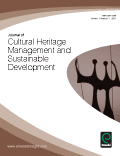
Journal of Cultural Heritage Management and Sustainable Development
Transforming cultural heritage through sustainable practices.Journal of Cultural Heritage Management and Sustainable Development is a pioneering publication dedicated to advancing the fields of cultural heritage management and sustainable practices. Published by Emerald Group Publishing Ltd in the United Kingdom, this journal has established itself as a critical resource since its inception in 2011, with an ongoing commitment to quality research through 2024. The journal is notably recognized with a Q1 ranking in Conservation and boasts impressive Scopus rankings, highlighting its significant impact in the realm of arts and humanities. It also showcases a multidisciplinary approach, bridging gaps between business management and urban studies, thereby providing invaluable insights to researchers, professionals, and students. With diverse access options to engage a broad audience, the Journal of Cultural Heritage Management and Sustainable Development thrives at the intersection of scholarship and practical application, making it an essential read for those dedicated to fostering sustainable development in cultural heritage contexts.
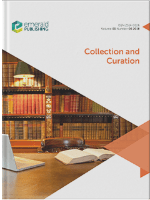
Collection and Curation
Advancing the Art of Collection and CurationCollection and Curation is a prominent academic journal published by EMERALD GROUP PUBLISHING LTD, dedicated to the fields of Library and Information Sciences and Museology. With a significant impact in its domains, the journal has achieved a category quartile ranking of Q3 in Library and Information Sciences and Q2 in Museology as of 2023. It is noteworthy that in the Scopus rankings, it stands at an impressive #8 out of 83 in Museology, placing it in the 90th percentile, while also ranking #112 out of 280 in Library and Information Sciences, positioning it within the 60th percentile. Since its inception in 2018, the journal has been instrumental in advancing research and discussion around the critical themes of collection development and curation methodologies. Although it currently does not offer open access, the journal's rigorous peer-review process ensures high-quality scholarly contributions that are indispensable for researchers, professionals, and students aiming to enrich their understanding and practices in these important fields. By focusing on innovative strategies, practices, and case studies, Collection and Curation continues to shape the future of information management and museum studies.

Archeomatica-Tecnologie per i Beni Culturali
Fostering Collaboration for Cultural Heritage Innovation.Archeomatica-Tecnologie per i Beni Culturali is a prestigious open-access journal dedicated to the field of cultural heritage technologies. Published by ARCHEOMATICA, this journal prides itself on disseminating high-quality research focused on innovative methodologies and technologies that enhance the preservation, conservation, and management of cultural assets. Since its inception in 2011, Archeomatica has fostered an inclusive platform for researchers, professionals, and students to share insights and advancements in the integration of science and technology within the cultural heritage sector. With a commitment to accessibility, all articles are freely available, promoting a collaborative academic environment. This journal is essential for those interested in bridging the gap between cultural heritage preservation and technological innovation, helping to ensure the longevity of our shared history.

Revista Electronica de Fuentes y Archivos
Preserving the Past, Shaping the FutureRevista Electronica de Fuentes y Archivos is a distinguished academic journal dedicated to the exploration of historical sources and archival studies. Published by the CENTRO DE ESTUDIOS HISTORICOS PROF CARLOS S A SEGRETI in Cordoba, Argentina, this journal has been an open-access resource since 2010, ensuring that a diverse audience of researchers, professionals, and students can freely access valuable scholarly work. The journal aims to foster dialogue and dissemination of knowledge within the fields of history, archival science, and documentation studies, promoting interdisciplinary collaboration. With its commitment to enhancing historical inquiry and promoting best practices in archival management, Revista Electronica de Fuentes y Archivos plays a pivotal role in supporting the academic and professional development of those dedicated to the preservation and interpretation of historical records.

Disegnarecon
Cultivating a vibrant community of thinkers and creators.Disegnarecon is a distinguished open access journal published by UNIV L AQUILA that has been contributing to the fields of architecture, urban studies, and the visual and performing arts since its inception in 2008. With an ISSN of 1828-5961, this journal serves as a pivotal platform for researchers, practitioners, and students to disseminate innovative ideas and findings. Renowned for its rigorous peer-review process, Disegnarecon has achieved notable rankings in 2023, securing a Q2 quartile in Architecture, a Q3 quartile in Urban Studies, and a prestigious Q1 quartile in Visual Arts and Performing Arts, highlighting its academic significance. The journal’s commitment to fostering interdisciplinary dialogue is further emphasized by its impressive Scopus ranks, where it stands at Rank #136 in Visual Arts and Performing Arts and Rank #96 in Architecture. Aimed at advancing knowledge and practice in its respective fields, Disegnarecon is an essential resource for anyone dedicated to exploring the intersections of design, culture, and urban environments, encouraging active participation in contemporary discourse.

Perspectivas em Ciencia da Informacao
Elevating the discourse in information systems and beyond.Perspectivas em Ciencia da Informacao is a premier academic journal published by Universidade Federal de Minas Gerais, specifically from the Escola de Biblioteconomia. Since its inception in 2006, this Open Access journal has become a vibrant platform for disseminating research in the fields of Library and Information Sciences, Information Systems, Communication, and Museology. With a reputation bolstered by its classification in multiple quartiles—ranging from Q2 to Q4 in 2023—this journal stands out in the Brazilian academic landscape, providing valuable insights and supporting knowledge development for researchers, professionals, and students alike. Its impact is further underscored by its inclusion in Scopus, where it ranks within the lower percentiles of its categories, highlighting its potential for growth and increasing relevance in the scholarly community. The journal aims to explore emerging trends and significant issues in information science, facilitating an essential dialogue among scholars and practitioners to propel the field forward.

PRESERVATION
Reviving Conversations on Historic IntegrityPRESERVATION is a distinguished journal published by the NATL TRUST HISTORIC PRESERVATION, focusing on critical issues in historic preservation and conservation within the realm of arts and humanities. With an ISSN of 1090-9931, this journal served as a notable platform for research and discourse from 2002 to 2018, although its coverage was discontinued in Scopus, where it held ranks that reflected its niche but valuable contributions to both visual arts and conservation. Despite its cessation, the journal remains a key resource for professionals and academics dedicated to preserving cultural heritage and advancing the study of preservation practices. The importance of PRESERVATION lies in its commitment to fostering an understanding of the challenges in maintaining historical integrity amidst modern developments. Researchers, practitioners, and students alike will find a wealth of knowledge and inspiration through its past issues, making it an essential reference point for those engaged in the ongoing dialogue around preservation methodologies and impacts.
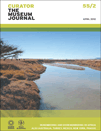
Curator-The Museum Journal
Connecting professionals and scholars to elevate museum practices.Curator-The Museum Journal, published by WILEY, is a preeminent interdisciplinary journal dedicated to advancing the fields of conservation and museology. With its significant impact factor and prestigious rankings—Q1 in both conservation and museology, and Scopus ranks of 9th and 17th respectively—this journal serves as an essential resource for researchers, professionals, and students engaged in the study and practice of museum studies. Since its inception, the journal has facilitated insightful discourse and innovative research focused on the preservation, interpretation, and management of cultural heritage. As a reliable platform for scholarly communication, Curator fosters a deeper understanding of the evolving role of museums in contemporary society, addressing critical issues related to conservation practices and the ethical stewardship of collections. With access options that enhance the dissemination of knowledge, this journal is integral to the global academic community, driving forward the conversation on how museums can adapt and thrive in a changing world.
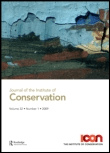
Journal of the Institute of Conservation
Uniting Experts in the Quest for Effective ConservationJournal of the Institute of Conservation is a leading academic journal dedicated to advancing the field of conservation, published by Routledge Journals, Taylor & Francis Ltd. With an impressive Q1 ranking in Conservation and a Scopus rank of #21 out of 103 in the Arts and Humanities category, this journal plays a pivotal role in disseminating high-quality research that shapes conservation practices and policies. Spanning the years from 2009 to 2024, it serves as a vital platform for scholars and practitioners alike, offering innovative perspectives on materials science, museology, and media technology. Accessible solely through institutional subscriptions, the journal invites contributions that engage with contemporary issues in conservation, ensuring that all articles foster interdisciplinary dialogue and enhance professional standards within the field. The Journal of the Institute of Conservation is thus essential for those committed to preserving our cultural and natural heritage.
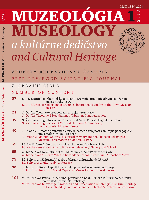
Muzeologia a Kulturne Dedicstvo-Museology and Cultural Heritage
Exploring the intersections of culture and conservation.Muzeologia a Kulturne Dedicstvo-Museology and Cultural Heritage is a premier scholarly journal published by COMENIUS UNIVERSITY BRATISLAVA, focusing on the vital intersections of museology, cultural heritage, and conservation practices. Since its inception in 2013, this open-access journal has established itself as a leading platform for high-quality research, boasting impressive rankings in the 2023 Scopus metrics—#15 out of 83 in Museology and #28 out of 103 in Conservation. With a commitment to fostering an inclusive academic community, the journal welcomes innovative studies and critical discussions that address contemporary challenges in preserving cultural assets. Operating under an open-access model since 2017, Muzeologia a Kulturne Dedicstvo ensures wide dissemination of research findings, thereby enhancing visibility and accessibility for scholars, professionals, and students worldwide. As it continues to converge from 2013 to 2024, this journal not only serves as a vital resource but also as a catalyst for advances in the understanding and practice of museology and cultural heritage preservation.